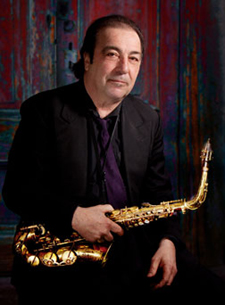 GREG ABATE
GREG ABATE
Greg Abate
began his musical education studying
clarinet and alto sax in the Woonsocket
Public Schools system and then enrolled at
the Berklee College of Music. His primary
influences were the modern jazz stylist Paul
Desmond and be-bop innovator Charlie Parker.
Upon graduating, he played lead alto with
the legendary Ray Charles for two years in
the mid-1970s then returned to Rhode Island
to launch his own career. He formed the
fusion band Channel One and released his
first album, Without Boundaries, in 1981.
After spending two years with the Artie Shaw
Orchestra in the mid-1980s, he embarked on a
solo career showcasing his unique, hard
post-bop style which has brought him
worldwide acclaim. He was dubbed “The Prince
of Be-Bop” by jazz impressario John Chan and
has released nearly two dozen albums as a
leader. His 2002 album Evolution and his
2014 release Motif both placed high on jazz
charts around the globe and Mike Joyce of
The Washington Post wrote that “Greg Abate
is considered by jazz writers and
aficionados to be one of the most exciting
saxophone players out there today.” He has
collaborated and/or recorded with dozens of
the all-time greats including Phil Woods,
Richie Cole, Jerome Richardson, Kenny Barron
and Claudio Roditi. He is an adjunct
professor of Jazz Studies at Rhode Island
College and conducts workshops and master
classes throughout the United States and
Europe. He continues to tour internationally
and is currently recording for Whaling City
Sound. His latest release is Kindred
Spirits, a collaboration with Phil Woods
recorded live at Chan’s in Greg’s hometown
of Woonsocket.
 FRANKIE CARLE
(1903-2001)
FRANKIE CARLE
(1903-2001)
Frankie
Carle, born Francis Carlone in Providence,
Rhode Island in 1903, is one of the most
successful artists in Rhode Island music
history. As a composer, he wrote "Sunrise
Serenade,” Glenn Miller's million-selling
hit in 1939; as a musician, he was the
featured pianist for Horace Heidt's popular
band in the early 1940s; and as the
conductor of his own big band, he became a
star. From 1944 ’til the end of the decade,
he totaled 23 chart records including two #1
hits in 1946, both of which featured his
daughter, billed as Marjorie Hughes, as the
vocalist. When the big band era ended, "The
Wizard of the Keyboard" turned out a slew of
popular instrumental albums. He was honored
with a star on the Hollywood Walk of Fame
for recording in 1960 and was inducted into
the Big Band & Jazz Hall of Fame in 1989.
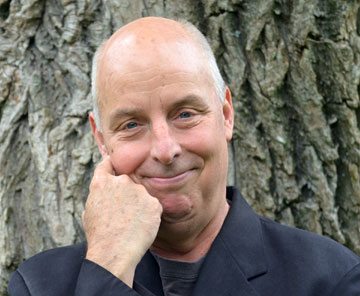 BILL HARLEY
BILL HARLEY
Singer/songwriter/storyteller Bill Harley
began performing in 1975. He launched his
career as a children’s performer from
Providence in 1980 and the following year,
he and his wife and manager, Debbie Block,
were two of the founders of the Stone Soup
Coffeehouse. In 1984, they created Round
River Records to release Bill's first album,
Monsters In The Bathroom. His star rose
rapidly and over the course of the next
three decades, he has released nearly three
dozen best-selling albums. He is one of the
most successful musicians in the history of
the genre and in 1990 Entertainment Weekly
dubbed him “the Mark Twain of contemporary
children’s music.” He is a two-time Grammy
award winner taking home trophies for Blah
Blah Blah in 2007 and Yes To Running! in
2009. But Harley defies the description of a
strictly “children’s music” artist. Along
the way, he has lent his voice, in the
tradition of Pete Seeger and Woody Guthrie,
to social, environmental and political
causes and has released five albums of adult
folk music. He has had an equally successful
career as an author, storyteller and NPR
commentator/host and has won dozens of
awards including Gold and Silver Parents’
Choice awards and the Oppenheim Toy
Portfolio’s highest honor, the Platinum
award. In 2010, he was the recipient of the
Rhode Island Humanities Council Lifetime
Achievement Award and in 2015 an Honorary
Degree from Hamilton College.
 CARL HENRY (1920-1986)
CARL HENRY (1920-1986)
Carl Henry
was the disc jockey who introduced Rhode
Islanders to the sounds of Rock ’n’ Roll in
the 1950s. From 1952 until the end of the
decade, his radio shows on WRIB and WPAW
exposed the "hidden sounds" of Rhythm &
Blues to everyone who cared to listen, but
it wasn't until the mid-1950s that Caucasian
teenagers glommed onto him with a passion.
He was a true Rock ’n’ Roll pioneer. His
Providence record shop, "Carl's Diggins"
(originally adjacent to the Celebrity Club
in Randall Square then later on North Main
Street), was open from 1952 to 1985 and was
the hot spot to find those great discs. He
was also a concert promoter (he brought The
Rolling Stones to the Loew’s State Theatre
in 1964) and was a lifelong jazz aficionado
and champion of jazz musicians. Cleveland
and New York City had Alan Freed, Buffalo
had George "The Hound" Lorenz and Rhode
Island had Carl Henry!
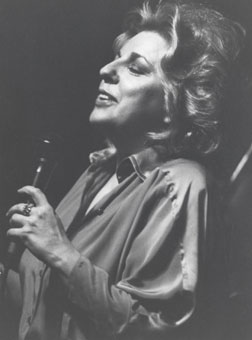 CAROL SLOANE
CAROL SLOANE
Jazz
vocalist Carol Sloane grew up in Smithfield
and began her professional career in 1951
singing with Rhode Island society band
leader Ed Drew. She first gained national
attention in the late 1950s when she joined
the orchestra of Larry Elgart with whom with
she recorded for RCA Victor. In 1961, Jon
Hendricks of the legendary vocal trio
Lambert, Hendricks & Ross, who had become a
fan of Carol’s after hearing her at a jazz
festival, helped her secure her first
booking at The Village Vanguard opening for
Oscar Peterson. He next convinved the
producers of the Newport Jazz Festival to
include her in their “New Stars” program
that summer, a showcase for emerging talent.
She garnered rave reviews for her
performance and was heard by a
representative of Columbia records. Columbia
signed her and she recorded an album a few
months later. Released in 1962, Out Of The
Blue was unanimously praised by the press
and launched her on a solo career which has
continued for nearly six decades. She has
recorded more than two dozen critically
acclaimed, internationally released albums
as a leader in the company of dozens of jazz
legends and giants including Clark Terry,
Tommy Flanagan, Bob Brookmeyer, Art Farmer,
Jim Hall, Sir Roland Hanna, Ben Webster and
Phil Woods, just to name a few, and
continues to perform. In a 2007 review of
her album “Dearest Duke,” Matt Schudel of
The Washington Post wrote, ”If Carol Sloane
isn't America's greatest living jazz singer,
then no one deserves the title."
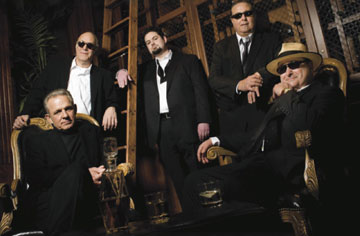 SUGAR RAY & THE
BLUETONES
SUGAR RAY & THE
BLUETONES
Raymond
“Sugar Ray” Norcia is a world-renowned,
award-winning blues vocalist, songwriter,
harmonica player and band leader. He began
his career on the Stonington, CT/Westerly,
RI scene in the 1970s. In 1979, he moved to
Rhode Island and formed The Bluetones with
keyboardist Anthony Geraci, drummer Neil
Gouvin, bassist Michael “Mudcat” Ward and
guitarist Ronald “Ronnie Earl” Horvath who
was replaced by Kid Bangham after one EP
release on Baron. The band enjoyed great
success as a touring act in the 1980s
culminating in two national releases for
Rounder Records in 1989 and 1991. The band
was put on hold for several years after Ray
accepted an offer in 1991 to join Roomful of
Blues with whom he recorded several albums
including the Grammy nominated Turn It On,
Turn It Up in 1996. Geraci formed his own
successful unit, Little Anthony & The
Loco-Motives, during this period, releasing
two albums and touring nationally. Ray left
Roomful in 1998 and reconvened The Bluetones
for a series of albums which has put them at
the top of the international blues scene.
Guitarist Michael “Monster Mike” Welch, a
star in his own right since his teens with a
series of national releases, joined in 2002
and the group celebrated its 35th
anniversary in 2014. Their current album,
Living Tear To Tear, is a best-seller which
received an unprecedented seven Blues Music
Award nominations.
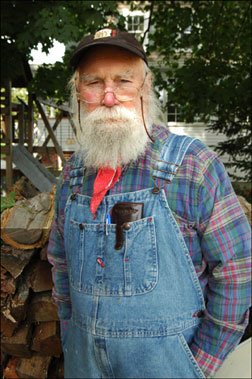 RICHARD WALTON
(1928-2012)
RICHARD WALTON
(1928-2012)
Richard
Walton was a college professor, the author
of twelve books and a newspaper reporter
with a lifelong passion for music. His life
focus was social and political activism and
his ability to create and sustain community.
He grew up in Providence and graduated from
Brown in 1951 then wrote for The Providence
Journal and broadcast as a jazz disc jockey
on WICE interviewing musical giants such as
Louis Armstrong as they came through town.
From 1955 to 1967, he worked in New York
City as a reporter and a broadcaster
maintaining his jazz contacts and developing
new ones within the progressive folk
community with essential artists such as
Jack Hardy, Dave Van Ronk and Rosalie
Sorrels. He returned to Rhode Island in 1981
and gradually became involved in the Stone
Soup Coffeehouse. He recognized the
connection between music and organizing and
viewed music as an expression of a community
and of a particular community of people that
viewed folk music as a comment on our
culture. When they incorporated, Richard
Walton became the first president of the
Stone Soup Folk Arts Foundation, a position
he held for fifteen years. Acting as host
and MC at every show, Richard’s colorful
persona and ever-present red bandana put a
face on the organization and he became known
as “the voice of Stone Soup.” He opened his
home to the touring artists as they came
through town helping to build a nationwide
network of support. He mentored many young
musicians and his policy of inclusion
provided encouragement to emerging artists
such as Holly Near and Cheryl Wheeler. He
extended these principles out into the music
community at large during his tenure on the
board of the Pawtucket Arts Festival and at
his legendary birthday parties which raised
large sums of money for his favorite
progressive causes. His legacy continues
through Stone Soup and the community he
inspired and is celebrated through the Red
Bandana Fund, an annual financial award made
to an organization or individual whose work
best represents the ideals of peace and
social justice that exemplify Richard's
life’s work.
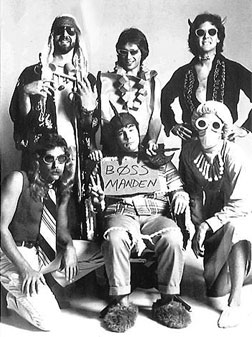 THE FABULOUS
MOTELS/THE YOUNG ADULTS/RUDY CHEEKS
THE FABULOUS
MOTELS/THE YOUNG ADULTS/RUDY CHEEKS
In the
1970s, the Rhode Island original rock music
scene was defined by two bands, The Fabulous
Motels and The Young Adults. Both groups
featured singer/songwriter Bruce “Rudy
Cheeks” McCrae, singer/songwriter/drummer
Dave “Sport Fisher” Hansen and
songwriter/pianist Jeff Shore. Formed in
1970, the Motels, which also featured actor
Charles Rocket on vocals and accordian and
artist Dan Gosch on toy drums and other
visual embellishments, performed their
unique blend of music and comedy at colleges
and underground clubs throughout the
Northeast and in Manhattan. When no record
deal materialized, the group disbanded in
1973. McCrae, Hansen and Shore reconvened in
1975 to form The Young Adults. They mined
similar territory to the Motels, but there
was a new focus on the musical aspects with
some of Rhode Island’s finest players
passing through the ranks until their 1979
breakup including guitarist Ed Vallee and
bassist/guitarist Thom Enright. The Adults
were enormously popular and successful. They
enjoyed a regional hit with their indie
single “Complex World;” they were featured
in two nationally released motion pictures
by director Jim Wolpaw, the documentary
Cobra Snake For A Necktie and the musical
comedy/action picture (It’s A) Complex World
for which they reunited in 1987; and had one
national album release, the Complex World
soundtrack Helping Others. The true legacy
of the two bands, however, is their
far-flung influence on the Rhode Island arts
scene - they have been cited as an
inspiration by dozens of musicians including
the Talking Heads and The Probers and by
film makers Peter and Bobby Farrelly. Since
1980, Rudy Cheeks has enjoyed a diverse
career in media working as a newspaper
columnist, a radio talk show personality,
host of a musical comedy television show and
a nightclub entertainer and is highly
regarded as a champion of the arts. He
continues to pursue his musical vision.